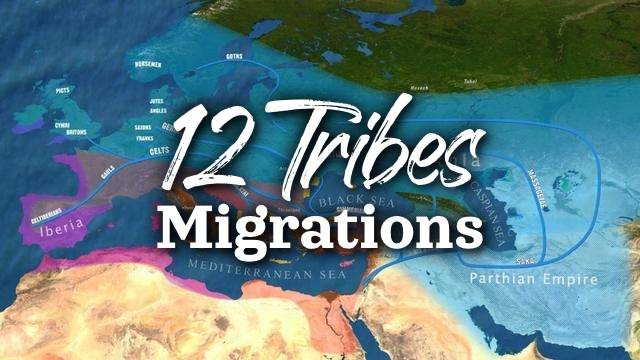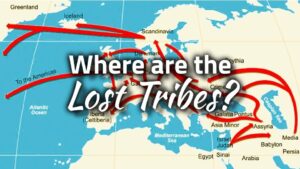Latest Posts
Why Was Christ Baptized?
Why was Christ Baptized?
Why was Christ baptized? This is a popular question which the church has attempted to answer with fabricated ordinances and rituals that are entirely unscriptural in regards to what baptism was and how it was interpreted. In regards to the baptism of Christ, He answered that His personal baptism was necessary in order to fulfill all righteousness. Righteousness is the keeping of the Law. Therefore what Law was Christ fulfilling in being baptized?
We know that Christ was our final Passover lamb (1 Cor 5:7), a sin offering, a peace offering, and more for the children of Israel. Therefore in order to be a legitimate sacrifice, the life of Christ must have fulfilled the Levitical laws related to sacrificial offerings as much as His life must have been guiltless, as He was our unblemished lamb (John 1:29, 1 Peter 1:19). In Leviticus, we read that a sacrifice needs to be washed before it can properly be offered on the altar:
Leviticus chapter 1:1-3: “1 And the LORD called unto Moses, and spake unto him out of the tabernacle of the congregation, saying, 2 Speak unto the children of Israel, and say unto them, If any man of you bring an offering unto the LORD, ye shall bring your offering of the cattle, even of the herd, and of the flock. 3 If his offering be a burnt sacrifice of the herd, let him offer a male without blemish: he shall offer it of his own voluntary will at the door of the tabernacle of the congregation before the LORD… 9 But his inwards and his legs shall he wash in water: and the priest shall burn all on the altar, to be a burnt sacrifice, an offering made by fire, of a sweet savour unto the LORD….
We also read that the Levitical priests themselves had to be washed for a sacrifice to be legitimate:
From Leviticus 8:4-6: “4 And Moses did as the LORD commanded him; and the assembly was gathered together unto the door of the tabernacle of the congregation. 5 And Moses said unto the congregation, This is the thing which the LORD commanded to be done. 6 And Moses brought Aaron and his sons, and washed them with water.”
To fulfill these needed requirements for the Levitical priests and the cleansing of a sacrifice, we see in a prophecy of John the Baptist found in Malachi, that he would “purify the sons of Levi” (Mal 3:3). Christ Himself confirmed that John was the Second Ministry of Elijah, the one who would perform this. John cried out his voice in the wilderness and washed any true Israelite who came to him in the Jordan river, and through this he himself and many other Levites were cleansed and purified. It is important to identify that John would not cleanse those who were not of Israel, even if they were geographically from Israel (Rom 9:6). A prime example being those Idumean Pharisees, who were the offspring of vipers, and had no part in the Body of Christ (Antiquities 13:9:1, Strabo 16.2.34). Christ agreed, and Judas Iscariot also, an Idumean, was similarly not cleansed through the words He spoke to His apostles (John 13:10). Christ confirmed that it is His Word of Truth that cleanses (John 17:17-19).
Once the Levites were purified, Christ of course came to be baptized Himself after fulfilling the required thirty years for Him to be of age to teach (Num 4:3). Christ’s life and ministry was a perfect fulfillment of the Law and Prophets (Mat 5:17), and throughout His ministry He would also fulfill all the Levitical laws related to the offering of a legitimate sacrifice. We see another instance for example where He prevented Mary Magdalene from touching Him after His resurrection (John 20:17) in fulfillment of another aspect of Leviticus 1 which says:
Lev 7:19-20: And the flesh that toucheth any unclean thing shall not be eaten; it shall be burnt with fire: and as for the flesh, all that be clean shall eat thereof. But the soul that eateth of the flesh of the sacrifice of peace offerings, that pertain unto the LORD, having his uncleanness upon him, even that soul shall be cut off from his people.
No sacrifice is complete until it is offered to Yahweh: the whole burnt offerings were burnt until little was left and the smoke symbolically sent it all to God, this being the sweet savour (Lev 1). Christ being sacrificed, had to first present Himself before God until one could touch Him. This is because in Leviticus 7, it is commanded that if anyone with unclean hands touches the sacrifice, it would make the sacrifice illegitimate and they who touched it themselves would then be cut off from the people. Therefore, if Mary Magdalene had touched Christ before He had ascended to the Father, the sacrifice would have been voided, she would have been cut off, and it all would have been for nothing. It is amazing the extent Christ had went to fulfill His Law and it is an example to us also to read and understand the Law and Prophets, so that we can better understand Him and our place in the world.
It is evident that Christ had completed His task of ascending and presenting Himself to God between this dialogue with Magdalene and His later encounter with the apostles.
So John fulfilled the duty of the Aaronic priesthood, being a descendant of Aaron himself. Being a Levite, he could fulfill the priestly role of cleansing which Moses had done first before him.1With the priesthood no longer consisting of Levites at the time of John, of course no Sadducee would never have ever been able to fulfill such a role as this. We read that the Levites at the time of John were in fact starving because of the oppression they experienced from the Sadducees, who stole from them their birthright of priesthood. Interestingly, Christ subtly eludes to the corruption of the Levitical priesthood when He mentions a priest and Levite separately in His parable of the Good Samaritan (Luke 10:31-32).
We know of course, that there should have been no distinction between a priest and a Levite in that parable, because if one was not a Levite, they were not a legitimate priest (Mal 2:8, Lev 21:15). The denominational scholars will read the parable a hundred times and twist it to support universalism: but will never notice this subtle nod which Christ makes and its associated implications. Yahweh prophesied through Malachi that the priesthood would become further corrupted (Mal 2:3), and as it was fulfilled it allowed for Christ to be killed by the power of the dog (Psalm 22:20), just like the other prophets which had preceded Him (Luke 11:51). Christ is the last prophet (Hebrews 1).
So this was the purpose of the baptism of Christ: to cleanse the offering in preparation for its coming sacrifice. However, baptism as a ritual was not unheard of at the time and was in fact well known. Yahweh speaks to His people through terms they understand in the times which they are living, for example having done this when making His oath to Abraham (Gen 15:17). The Pharisees when hearing of John’s baptism did not ask what baptism was, but asked John who gave him the authority to baptize, as they ostensibly perceived John as a lesser man than themselves (John 1:25). The Pharisees themselves performed a ritual similar to John’s baptism when they accepted new proselytes (Lightfoot’s volume 2 on pages 55 to 63 in A Commentary on the New Testament ).
The Pharisees viewed immersion as a rebirth, and aliens would be considered Israelites after the vain ritual was completed. The Pharisaical understanding was later adopted by the Roman Catholic Church and is now shared by nearly all denominational churches. This is a mistake. While the Pharisees would baptize anyone and make them twice the sons of hell (Mat 23:15), John refused to baptize vipers (Mat 3:7). Christ also rejected the traditions of the elders, saying “ye hold the tradition of men, as the washing of pots and cups: and many other such like things ye do.” Concluding that “Full well ye reject the commandment of Yahweh, that ye may keep your own tradition” (Mark 7:1-23) These traditions were not scriptural, but came from the rites and practices of men.
Many of Christ’s apostles were former students of Johannes and clang for a time to their former teacher’s ways. The apostles did not immediately understand the purpose of the baptism of Johannes, therefore while the apostles baptized some during the Ministry of Christ, Yahshua Himself did not baptize anyone. John himself is recorded at Matt. 3:11 as stating: “I indeed baptize you with water unto repentance: but he that cometh after me is mightier than I, whose shoes I am not worthy to bear: he shall baptize you with the Holy Ghost, and with fire” Christ affirmed shortly before His departure that “Iohannes immersed in water, but you shall be immersed in the Holy Spirit after not many days hence”.(Acts 1:5)
The apostles did not even understand the technicalities behind the requirement for the Messiah’s death, until after several periods of time and revelation from Christ Himself. This was often in waves of independent growth and understanding. The transition from the Old to New Covenant is recorded in the Book of Acts and was an era of learning for them, as they came to understand the meaning of the New Covenant in its scope and purpose.
So while in the beginning of Acts we see that they did not fully understand why John had baptized, by the end of the account growth and understanding had enveloped them and their assemblies. Peter at the household of Cornelius saw that they were baptized with the Holy Spirit, and adjusted his understanding (Acts 11:15-16). The baptism of John was for Christ and the sons of Levi, and from that point forward Christ informs them that they are to baptize with the Holy Spirit. This baptism was the immersion into His death, which the crucifixion had allowed after the washing of the sacrifice (Rom 6:3). But once the sacrifice had been made, the baptism of John was no longer required.
Therefore we read of when Priscila and Aquila saw Apollos still teaching of the baptism of John, they took him aside and “expounded unto him the way of Yahweh more perfectly” (Acts 18:24-26). While the apostles went on to baptize during the Acts era, during the transition we see an evolution of understanding regarding what Christ had meant when He said that the baptism of water was for John, but they were to baptize with the Holy Spirit. There is more to be said on this subject, and this will be the subject of a coming video.
The baptism of Christ was what it was, despite how men sought to interpret it in the generations that followed. Many incorporated their former pagan ideas in their attempts to understand its meaning. The meaning was of course defined in the Old Testament, which Christ came to fulfill, and was not a new ritual sprung out of thin air. In fact, the works of the Law are done away with (meaning the rituals and rituals only; namely anything related to the Leviticus priesthood2). This passing does not include the moral Laws of God apart from the rites and rituals of the Levitical priesthood, for those are eternal (Mat 5:18, Rom 3:31). If it was required at a time for men to be cleansed in water, to prepare and present sacrifices, such is no longer required, for we now have Christ, who died once as a sacrifice (Heb 10:12). With this simple understanding of what the Baptism of Christ was, we once again open many doors and opportunities towards understanding scripture on a more cohesive level.
The word baptism comes from the Greek word baptizo, which literally means immersion. Therefore Christ said he had an immersion to be immersed in, which was His death. This is the same baptism which Paul and Peter speak of in their epistles, a baptism of the Word, of His Death, and not of the immersion of the flesh. The baptism which was fulfilled in the Jordan river was the baptism which was required for Christ to be a legitimate sacrifice. This baptism was the preparation for salvation, but salvation is not from the baptism of John but is rather from the sacrifice which was sanctified through it: that being Christ.
Having been sacrificed, we are able to enter into His baptism: which is His death. If we die with Him, then we live with Him also (Rom 6:8). Therefore, as Paul said, we have His marks on our body, being regarded dead in body but alive through Christ (Gal 6:17). This is the immersion for the children of Israel, and they have no further need for cleansing. To think otherwise is to believe that men need rites and rituals to be saved, and that Christ alone was not enough. That is the heresy of the Judaizers, the heresy of the Nicolaitans, and of all modern churches.
Let none steal away our liberty in Christ to bond us in rituals, for His sacrifice certainly sanctified all of Israel, and indeed we are sanctified.








